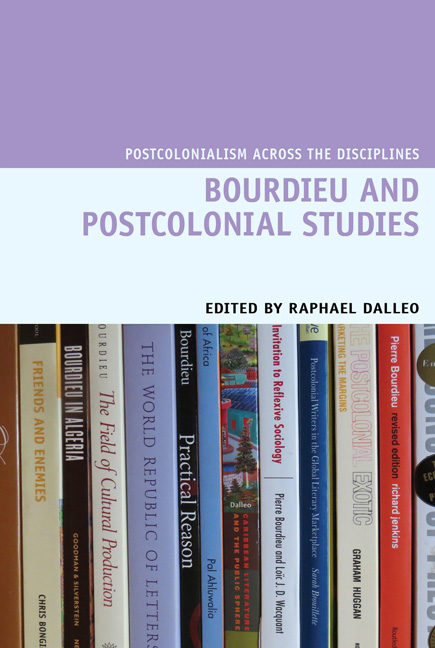Book contents
- Frontmatter
- Contents
- Permissions
- Introduction
- 1 Writing at the Margins: Postcolonialism, Exoticism and the Politics of Cultural Value (from The Postcolonial Exotic)
- 2 Exiles on Main Stream: Valuing the Popularity of Postcolonial Literature (from Friends and Enemies)
- 3 Postcolonial Authorship Revisited (from Postcolonial Writers in the Global Literary Marketplace)
- 4 Bourdieu and Fanon on Algeria
- 5 Style as Habitus: World Literature, Decolonization and Caribbean Voices
- 6 Playing the Game? The Publication of Oswald Mtshali
- 7 Fields in Formation: English Studies and National Literature in South Africa (with a Brazilian Comparison)
- 8 Archived Relationships: Pierre Bourdieu and Writers of the Caribbean Diaspora
- 9 Irony in the Dungeon: Anamnesis and Emancipation
- About the Contributors
- Index
3 - Postcolonial Authorship Revisited (from Postcolonial Writers in the Global Literary Marketplace)
- Frontmatter
- Contents
- Permissions
- Introduction
- 1 Writing at the Margins: Postcolonialism, Exoticism and the Politics of Cultural Value (from The Postcolonial Exotic)
- 2 Exiles on Main Stream: Valuing the Popularity of Postcolonial Literature (from Friends and Enemies)
- 3 Postcolonial Authorship Revisited (from Postcolonial Writers in the Global Literary Marketplace)
- 4 Bourdieu and Fanon on Algeria
- 5 Style as Habitus: World Literature, Decolonization and Caribbean Voices
- 6 Playing the Game? The Publication of Oswald Mtshali
- 7 Fields in Formation: English Studies and National Literature in South Africa (with a Brazilian Comparison)
- 8 Archived Relationships: Pierre Bourdieu and Writers of the Caribbean Diaspora
- 9 Irony in the Dungeon: Anamnesis and Emancipation
- About the Contributors
- Index
Summary
Preface
Below is a shortened version of a chapter from my book, Postcolonial Writers in the Global Literary Marketplace. In it I outline processes of corporatization and globalization in the mainstream publishing industry, I argue for reading postcolonial literature in relation to these, and I discuss how Pierre Bourdieu's studies of the field of cultural production can inform an approach to postcolonial authorship. In revisiting the chapter now, after more than ten years, I naturally find a number of arguments I would handle differently. This preface mentions some shifts in emphases—by no means radical departures—that arise from my continued engagement with Bourdieu's thought.
Bourdieu's work on cultural production considers the dialectical relationship—rather than absolute dichotomy—between autonomous and heteronomous cultural spheres. He presents a restricted world of literary works whose authors stage their disregard for material reward as they pursue autonomy, and, separate from that world, a heteronomous sphere of mass production for broad consumption. The two fields, however analytically separable, are always mutually determining. Autonomy is not an absolute position to be inhabited by the pure of heart. It is a constant horizon of one's practice rather than a cozy seat one settles into after making particular gestures of refusal and acceptance. This seems fairly clear.
Somewhat more opaque is a general ambivalence in Bourdieu's treatment of culture's autonomization as an ongoing process. In the material included below, I discuss the postscript to The Rules of Art, in which he stresses the real power of the idea that it is possible for artists to achieve autonomous distance from market imperatives. I call this a moment of crisis for him. I would not call it a crisis now though, and indeed even in the original chapter I retreat from that term somewhat. What I would want to insist on instead is a reading of the postscript as one of several moments in Bourdieu's oeuvre in which he is uncertain about his own practice of debunking the illusio of cultural prestige. This illusio is the belief that acclaim is actually a response to something internal to the work rather than the product of a particular social situation, and it locates the source of value in the singular merits of the author.
- Type
- Chapter
- Information
- Bourdieu and Postcolonial Studies , pp. 80 - 101Publisher: Liverpool University PressPrint publication year: 2016



